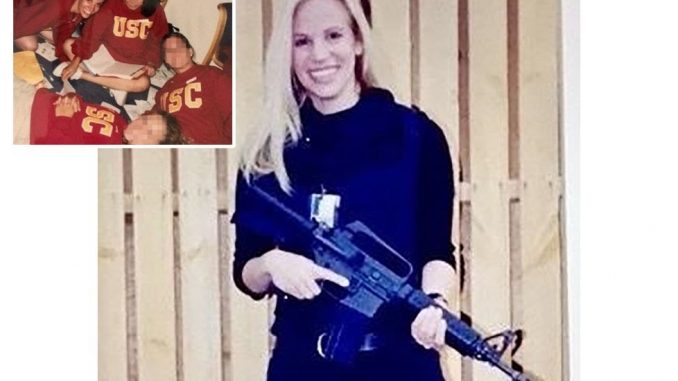
Tracy Walder arrived at the University of Southern California in 1996, and rushed Delta Gamma soon after. For the studious yet bubbly Southern California native, the Greek system provided a built-in social life and a place where she happily “blended into the crowd” of slim, pretty blondes. She attended alcohol-soaked parties, was elected vice president of social standards, and writes that she would have decorated her room all in pink were it not for the objections of her roommate. They compromised on a flamingo-pink beanbag chair.
But her outward girliness concealed deeper interests. A history buff and self-described news junkie, she planned to be a teacher until fate — in the guise of the CIA recruiter she met at a jobs fair her junior year — intervened.
Perusing the various crowded booths, she spotted a CIA representative sitting by himself. Instinctively, she passed him her résumé, in part because she felt bad for him. “Do you want to be in the CIA?” he asked, taking her in.
“Yes, I do,” she answered, surprising herself. She realized at that moment that she was telling the truth, she explains in her new memoir, “The Unexpected Spy: From CIA to The FBI, My Secret Life Taking Down Some of the World’s Most Notorious Terrorists” (St. Martins), out Tuesday, with co-writer Jessica Anya Blau.
Months later, after two lie-detector tests and a series of grueling interviews, Walder was offering that very same beanbag chair to a CIA operative who arrived at the Delta Gamma house unannounced to interrogate her references: four of her closest sorority sisters.
Walder started at Langley in 2000, at the age of 21, eventually becoming an expert in al Qaeda and chemical weapons and interviewing captured terrorist associates in the Middle East. Although she didn’t exactly look the part of a Middle East scholar, Walder writes that she had been terrified of Osama bin Laden for years, having caught a harrowing television interview with him in 1997. Then the unthinkable happened: That very same man attacked the United States on September 11, 2001.
“The plane might as well have crashed into the south side of my body,” Walder writes of watching live footage of American Airlines Flight 77 slamming into the Pentagon. “The pain, the guilt, the sense that my failures were resulting in lives lost . . . erased all other thoughts.”
Soon after, Walder was assigned to an elite counterterrorism unit devoted to stopping al Qaeda: “I was ready to even the score,” she writes.
Walder began traveling the world, moving from Europe to the Middle East to Africa in an effort to foil global terrorist attacks. She dealt with sexism — one African liaison dismissively nicknamed her “Malibu Barbie” — as well as exhaustion and homesickness. She worked seven days a week and skipped family holidays with her parents back home in Los Angeles.
Meanwhile, in the months after 9/11, Walder says, the White House was only interested in intelligence that linked al Qaeda to Saddam Hussein. The problem? There wasn’t any.
“The whole thing felt like a nutty fun-house game,” she recalls. “No matter what we reported to the administration, they turned it around, turned it inside out, and spat it back out with some non-truth.”
At the same time, she wondered if she could ever settle down and start a family as a spy. On a whim, she applied to the FBI — and got in.
There, she helped thwart a husband-and-wife team of Chinese operatives named Chi and Rebecca Mak, an eccentric couple who had lived in Los Angeles since the 1970s. Chi worked for Power Paragon, a company that developed products for the US Navy. The pair kept to themselves and ate their meals off newspaper instead of plates. Walder had the glamorous job of combing through their garbage.
But what she found, with the help of a Chinese translator, astonished her.
Among pages of balled up, greasy newsprint, they discovered a “tasking list [that] clearly identified classified materials that Mak was supposed to supply the Chinese government.” It turned out he had been stealing military secrets for decades.
Despite this success, the new job wasn’t a good fit for Walder. After her time at Langley — which she describes as a meritocracy — the FBI was a classic boys’ club, and “I was The Girl,” she writes. As soon as she started, she said, she was bullied and hazed by sexist training officers. In one particularly baffling incident, she was disciplined because the suit she was wearing was “distracting.”
Walder lasted 15 months at the FBI, noting that “currently, there are a dozen women who have filed a complaint against the[m] with the Equal Employment Commission.” Now she lives in Dallas with her husband and her daughter, and teaches at an all-girls school. Her new mission is to inspire young women to pursue intelligence jobs and thus transform the agency’s culture from the inside-out.
“I’m not afraid of big goals,” she writes.
*Story by New York Post